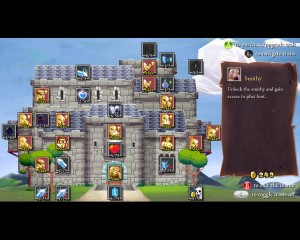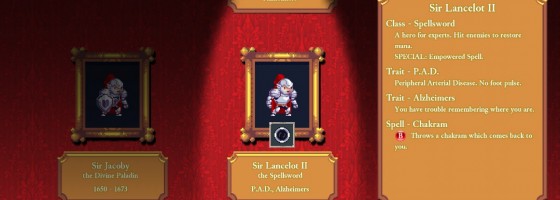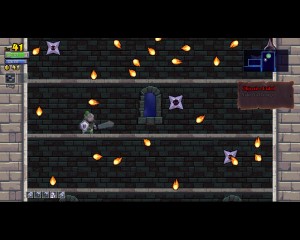In the past I’ve talked about how great it is to see games inspired from rogue-like design to do their own thing and in the process we’ve gotten a number of great games. Such as The Binding of Isaac which is my current favorite from this trend. Rogue Legacy walks in the same footsteps with an action game with rogue-like mechanics. But there is one thing that stood in the way for me loving it.
A Roguish Family:
The plot of Rogue Legacy is that your family has been tasked to explore a mysterious castle to find a cure for the king’s illness. The castle itself seems to be magical and will change its floor plan each time you enter it.
The twist of the game is that like a traditional rogue-like you are going to die a lot while playing, but here, each time you die, a new child will take your place. Each time you restart, you’ll have three children to choose from with their class based on which ones you have unlocked (more on that in a minute), along with randomized traits.
Traits ranged from major affects like being extra small or extra large, to weird ones like OCD that lets you recover mana for breaking objects. Regardless they do a good job of further differentiating the children from each other.
After choosing a child, you’ll be taking to the pre-castle area where the game’s meta-game progression takes place. The gold that you find in the castle can be used to upgrade your manor which in turn offers passive bonuses and unlocks new classes. Each time you spend money to upgrade a part of the castle, it raises the default price for all other upgrades, requiring you to weigh the upgrades in order of importance to you.
The second form of meta-game progression comes from the equipment you can build. Inside the castle, you can find blueprints of equipment or magic runes in chests, both that can be unlocked with gold and equipped on your character. These items can be taken on or off and allow you to further define a character more specifically.
When you’re ready you can talk to Charon the gatekeeper who will take away your money (to start fresh) and then enter the castle.

The manor allows you to determine the order in which you’ll unlock upgrades and the long term Meta-game progression
As mentioned, the general floor plan of the castle is randomized each time you play ( you can spend money to lock a floor plan for continued visits,) but the overall floor pattern remains constant with the castle made up of four areas of escalating difficulty.
Each class has a basic skill that they can use and usually a magic attack that costs mana. While the game has a lot of rogue-like mechanics, the moment to moment gameplay feels more at home in a castlevania game. You’ll need to get the timing down for avoiding attacks and understanding your own attack range.
Despite the rogue-like mechanics, Rogue Legacy also draws comparison to bullet hell shooters with enemy attack patterns. Many bosses and normal enemies fire a ludicrous amount of fireballs, ice etc at the player, forcing you to dodge the best you can.
Rogue Legacy really comes close to scratching every itch I had with The Binding of Isaac, if not for one element of the design that I wouldn’t say ruins the game for me, but sours my experience somewhat.
Progression Block:
The big problem for me with Rogue Legacy comes down to its progression and meta-game system by the fact that once you start playing, progression disappears while you’re in the castle.
What I mean is that before and after a castle run, the meta-game systems of manor upgrades and equipment can be utilized to affect subsequent runs. However, once you start playing inside the castle, there is no further progression that you can utilize until you restart.
That character will respond the same exact way from the second you start, until that character either beats the game or dies. What ends up happening is that you start playing the game not for the current run, but several runs down the line when you have the combination of character, manor upgrades and equipment needed to take down the boss and then repeat.
The only factor in terms of progression is finding gold; there is no experience that can be used to make your current character stronger.
One of my favorite parts of The Binding of Isaac and other rogue-like-ish type games is how much things can change over the course of a single play.
Maybe your prized crew member dies in FTL, or you find a really good item in Binding of Isaac, something to upset the status quo and keep the player guessing. And by doing so made each run a unique experience; perfect for telling other players about.
But in Rogue Legacy, I found myself caring less about the characters that I was playing as and more focused on getting to each treasure chest so that I’ll have something new for next time.
Eventually for me, the thrill of exploring a new character gave way to tedium as the different runs started to bleed into each other.
Rogue Legacy was an interesting concept but ultimately I found its design too limited for the roguelike mechanics to fully immerse me, but I would be interested in seeing where the developers take this design further.




Pingback: The Danger of Forced Failure in Game Design | Game Wisdom()